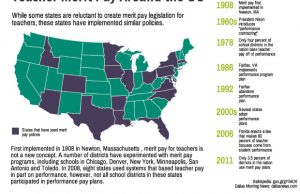While employees in countless fields have been paid based on merit, or job performance, the idea of merit pay for teachers had been a source of controversy.
Up for vote on Nov. 4, Missouri Constitutional Amendment 3, a merit pay bill for teachers, required Missouri teachers to be evaluated based on their students’ performance data, gathered from standardized testing. From this information, teachers would have been paid, dismissed and demoted. The bill would have also eliminated tenure and required teachers to enter into three-year contracts with public school districts, while prohibiting teachers to collectively bargain regarding the evaluation system.
“I think teachers will be fearful about their future in education, and for students it would be a detriment because well-established teachers making a decent living might choose to go out of state,” French teacher Dave Fritz said. “I think it would also be hard for Missouri to attract quality teachers to come here and teach.”
The State recently modified teacher evaluation standards, requiring teachers to be evaluated on nine standards which include cognitive engagement of students, implementation of curriculum standards and effect of instruction on individual class learning.
“In the end, a lot of what you do as a teacher is not quantifiable,” AP Language and Composition and creative writing teacher Jani Wilkens said. “The way you make students feel in your classroom, the way you create a climate where kids are willing to share and be wrong or the way you allow students to fail sometimes, just so they can realize a mistake to learn from. All these things are not figured out through tests.”
According to State Representative Bryan Spencer, the passing of Amendment 3 would have also meant the loss of parent rights in their child’s education, as well as the removal of power from school districts to the Department of Elementary and Secondary Education (DESE).
“The other parts [of the amendment] that deal with turning over all control to DESE, the state agency, I do not like,” Spencer said. “I’m a strong believer that parents are the ultimate decision maker in a child’s education.”
Several states have tried to implement similar policies. In 2011, Texas’ District Awards for Teacher Excellence program was cut from $392 million to $24 million in funding, and has been renamed the Educator Excellence Innovation Program. Eligible teachers must submit plans to enhance educator performance in order to receive grant funding. In Florida, Senate Bill 736 was dedicated to performance pay based on teacher evaluations, providing a pay raise for educators rated “highly effective” and “effective.”
“I think when you create a competitive climate for teachers, it is so wrong when it comes to what you’re supposed to do as an educator,” Wilkens said. “As an educator, I am supposed to care about the futures of not only my own students, but all students, all kids, all people who are interested in learning.”















![Banning Bitter Truths [Opinion]](https://FHNtoday.com/wp-content/uploads/2025/03/A5420F3C-5A62-4390-A0DE-112E5DAFB16D-e1743114102833-1200x1128.jpg)